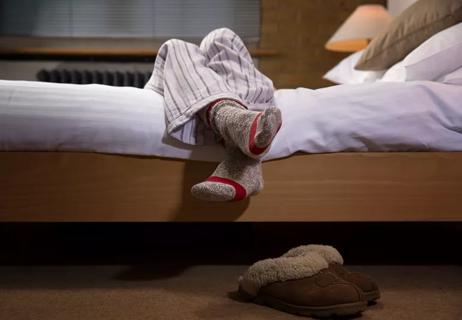If you’ve noticed changes in your mood and mental health while going through menopause, you’re not alone

Transitioning into menopause or perimenopause can be a turbulent time. Your hormone levels drop quickly, which can cause your period to fluctuate and then slow to a stop, while some other not-so-fun symptoms (hello, hot flashes) can also set in.
Advertisement
Cleveland Clinic is a non-profit academic medical center. Advertising on our site helps support our mission. We do not endorse non-Cleveland Clinic products or services. Policy
These changes may affect the chemicals in your brain and, in turn, your mood, too. And those hormonal-induced mood changes can include feeling anxious or depressed.
Psychiatrist Adele Viguera, MD, answers some questions about the mental and emotional aspects of menopause and how you can overcome these challenges.
It’s not “all in your head.” Hormonal changes can play a significant role in your mental health. Feelings of anxiety or depression can happen during menopause due to the fluctuation of estrogen and another key hormone, progesterone, in your body.
Not only that, but other possible effects of menopause, like lack of sleep, daytime hot flashes and night sweats, can all lead to symptoms of anxiety and depression.
A 2023 study noted that about 15% to 50% of perimenopausal and postmenopausal women may experience symptoms like anxiety, depression, forgetfulness and insomnia. The same study also found that the more severe your menopausal symptoms, the greater the degree of mental health symptoms like anxiety and depression you may experience.
You may be wondering how to identify anxiety caused by menopause. Feelings of anxiety can manifest in many ways, including:
Advertisement
Keep in mind, everyone experiences anxiety in life, and everyone experiences it differently. Anxiety becomes a clinical problem when it interferes with your everyday functioning and quality of life. Some people may primarily have psychological symptoms, while others may have more physical symptoms. The severity of symptoms can also vary.
With menopause, changes in hormone levels may influence neurotransmitters in your brain. The drop in estrogen levels can also lead to hot flashes that disturb sleep, which can then lead to a host of different problems, including depression. Studies like this one from 2018 consistently show that women are more vulnerable to experiencing depressive symptoms during the perimenopausal transition.
Keep in mind that you may also experience anxiety and depression together. “If you experience symptoms of depression or a loss of pleasure in things that you usually enjoy nearly every day for at least a two-week period or more, you might be depressed,” Dr. Viguera says.
She adds that it’s important to talk with your healthcare provider about finding the best treatment for you.
“Your healthcare provider will also want to rule out any medical causes for your depression, such as thyroid problems,” she notes.
If you’ve experienced anxiety in the past, you may have described your mood as “panicky.” Does this mean that having anxiety means you have a panic disorder? Not necessarily.
“Those with panic disorder have frequent panic attacks,” explains Dr. Viguera. “And, in between, they worry about when the next one will strike and try to avoid triggers or situations that can bring on an attack. Most commonly, panic attacks come out of the blue. A single or a few isolated panic attacks don’t mean you have a panic disorder.”
But people who are prone to anxiety or who’ve had postpartum depression are sometimes more likely to have a panic disorder during menopause. But anyone can develop one.
“Panic disorders can be hard to identify because some symptoms, such as sweating and palpitations, mirror many of the common symptoms brought on by perimenopause and menopause,” Dr. Viguera clarifies. “But just because a panic disorder isn’t easily diagnosed, that doesn’t mean it doesn’t exist or that you can’t treat it.”
Another frequent anxiety disorder is generalized anxiety disorder, which means you’re worried or anxious most of the day, nearly every day, for weeks and sometimes months. It’s important to keep in mind that for anxiety symptoms to qualify as a disorder, they have to interfere with your overall functioning.
Advertisement
Menopause-related symptoms can be tough to manage. And when it’s tied to your mind and mood, it can be even trickier to tackle. But there are lifestyle adjustments you can make and treatments you can use to help manage anxiety and depression.
“Staying calm” while having anxiety may sound like a piece of advice you’re tired of hearing. But practicing relaxation and mindfulness techniques (which is another way of staying present in the moment and not catastrophizing) allows you to feel at peace with your mental health again.
While intense anxiety — especially during menopause — can feel like climbing a mountain, there are ways to soothe your nerves in small but impactful ways.
To help manage your anxiety in the moment or before it hits, you can try the following:
Another way to curb anxiety or mental health symptoms is to focus on everyday habits. With that, maintaining a healthy lifestyle can help ease the menopause transition. Make sure you’re:
Advertisement
Hormone therapy is a treatment that boosts your hormone levels to relieve certain menopausal symptoms. While there’s growing evidence that hormone therapy can help with emotional symptoms, it alone isn’t effective in treating more severe mental health conditions.
“But if hot flashes and night sweats at bedtime are keeping you up at night, hormonal and nonhormonal treatments are available to help,” Dr. Viguera reassures. Depending on the severity of your condition, your healthcare provider may prescribe medication for anxiety or depression first. And you may feel better after you reach menopause and your hormones level out.
Lifestyle changes are important, but sometimes, you need to be honest with yourself if your mental health is starting to weigh you down. When depression or anxiety affects your quality of life, it’s time to see a doctor.
More specific reasons to seek help include:
Advertisement
“If you don’t have anyone to share your thoughts with, it’s hard to know if what you’re thinking makes sense,” Dr. Viguera relates. “A good therapist will offer an invaluable perspective on the issues most important to you and provide you with some coping tools and strategies.”
If you’re going through the transition of menopause, it can be normal to experience mood changes and even some symptoms of anxiety. But frequent, troubling, high anxiety or panic attacks aren’t something you should have to deal with.
That’s why it’s important to talk to a healthcare provider if you’re experiencing this. Managing anxiety and other mental health symptoms during menopause is possible through lifestyle changes, therapy and other treatments.

Sign up for our Health Essentials emails for expert guidance on nutrition, fitness, sleep, skin care and more.
Learn more about our editorial process.
Advertisement

Estrogen loss contributes to bone loss, which significantly raises your risk of osteopenia and osteoporosis

Making certain changes to your diet, sleep habits and even your wardrobe may help lessen the impact of menopause symptoms

A women’s health specialist explains those cold flashes that come on quickly

Changing hormone levels can bring issues like brittle nails, indigestion, dry skin and new allergies (to name a few!)

The choices you make at mealtime could reduce hot flashes or make them worse

Missed periods, heavy periods, painful sex and frequent hot flashes are just a few symptoms worth discussing with your provider

At-home tests measure FSH levels in urine, but they can’t actually diagnose menopause

You may be more prone to hot flashes if you have anxiety, but hot flashes can also rev up anxiety

Even small moments of time outdoors can help reduce stress, boost mood and restore a sense of calm

A correct prescription helps your eyes see clearly — but as natural changes occur, you may need stronger or different eyeglasses

Both are medical emergencies, but they are very distinct events with different causes